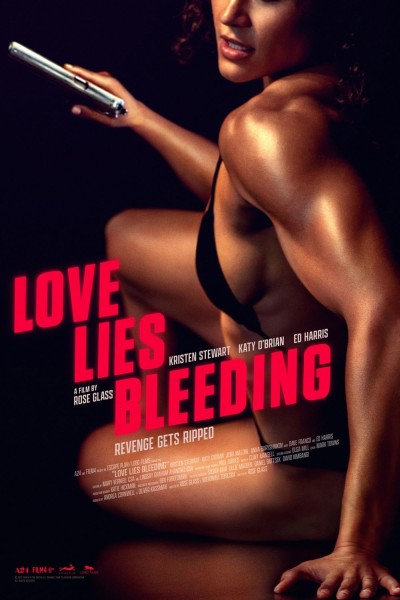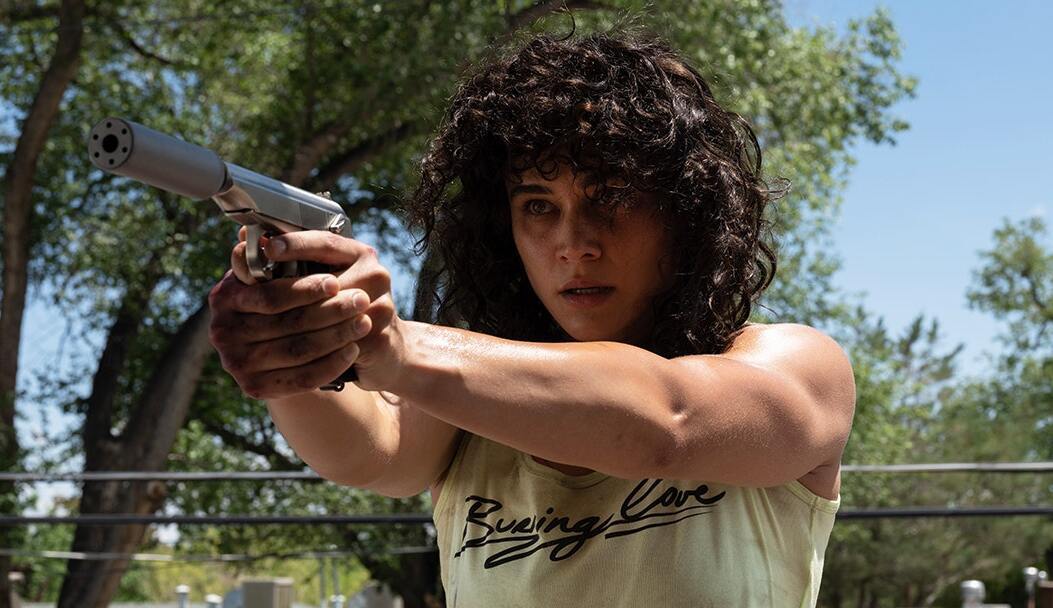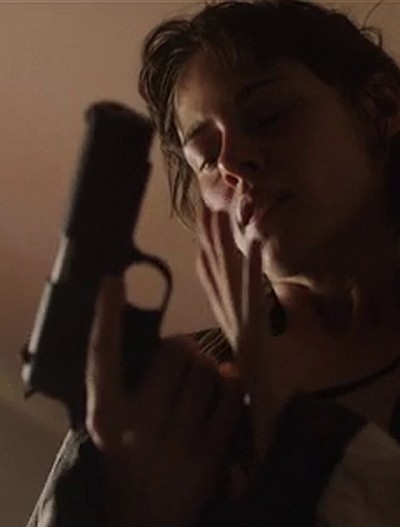★★★
“‘Roids and rage.”
In a trans-continental coincidence, both Dieter and I ended up watching and writing our own, independent reviews of this. At least we agreed on the three-star rating!
Well, you might or might not like the way this ends… However, you certainly will remember it. Credit director/co-writer Glass for apparently deciding to live (or die) by the mantra, “Go big or go home.” Literally. It’s in line with a general feeling she doesn’t want to take the easy options at any point here. It doesn’t always work. Boy, does it not. However, I respect the approach. It takes place in a small New Mexico town towards the end of the eighties, where Lou (Stewart) is a gym manager, a lesbian and the estranged daughter of Lou Sr. (Harris). He is a gun-range owner with a very shady sideline in arms dealing, and a desert ravine into which his enemies vanish.
Things are upset by the arrival in town of Jackie Cleaver (O’Brien), a bodybuilder on her way to Vegas for a contest. The two begin a passionate affair, in which Lou also introduces Jackie to the dubious joys of steroid use (though I’m fairly certain these do not work in quite the way depicted here). Lou has another situation, in that her sister Beth is trapped in an abusive relationship with her husband. Jackie decides to take care of this problem for Lou. However, doing so causes more issues than it resolves, not least in that it brings down law enforcement heat on Lou Sr. as the most obvious suspect. Dad demands his daughter fix things, causing Lou to threaten to expose her father to authorities.
 It’s all a very grubby take on the lesbian-noir genre, whose best-known example is probably Bound. Stewart seems consciously to be trying to break out of her Twilight reputation, though results so far have been mixed. At least this isn’t the Charlie’s Angels reboot, so for that, we thank her. It is not exactly subtle in its gender depictions: every single male depicted here is violent, though it’s interesting how Glass embraces the view that violence is the only solution, too. Though it’s complex: Jackie declines a gun, saying “Anyone can feel strong hiding behind a piece of metal. I prefer to know my own strength.” Let’s say, that’s not a position she maintains throughout.
It’s all a very grubby take on the lesbian-noir genre, whose best-known example is probably Bound. Stewart seems consciously to be trying to break out of her Twilight reputation, though results so far have been mixed. At least this isn’t the Charlie’s Angels reboot, so for that, we thank her. It is not exactly subtle in its gender depictions: every single male depicted here is violent, though it’s interesting how Glass embraces the view that violence is the only solution, too. Though it’s complex: Jackie declines a gun, saying “Anyone can feel strong hiding behind a piece of metal. I prefer to know my own strength.” Let’s say, that’s not a position she maintains throughout.
O’Brian, who was a bodybuilder before turning to acting, and has a black belt in hapkido, certainly has the physical presence needed for the role. I was less convinced by Stewart, feeling as if her character was stuck in a permanent sulk. The failure to establish her as likeable leaves the relationship with Jackie feeling implausible: if Lou has hidden depths of appeal, they’re apparently buried at the bottom of the Marianas Trench. The decision to wander off, on a number of occasions, into territory closer to David Lynch than the Coen Brothers is one I would not have made, personally, and is likely to alienate a significant number of viewers. A straight (pun not intended) telling of the story would have been preferred. But you do you, Rose. You do you.
[Jim McLennan]
Today on the menu: Lesbian thrillers! Somehow this seems to become the new “trend-du-jour” as a new sub-genre. This year already saw the Ethan Coen-directed lesbian crime comedy Drive Away Dolls and the novel adaptation Eileen with Anne Hathaway. Lesbian-themed movies seem to have come a long way since movies such as Desert Hearts (1985), Thelma & Louise (1991; hey, stop, were these two actually lesbians?) or Fried Green Tomatoes (1991). The difference today is that films can be more direct in their depiction of whatever they want to show. Whether this is really an advantage, is up to the individual viewer. Rose Glass (Saint Maud) shows in her second theatrical movie that she can keep up with male directors of bloody thrillers. The film was a co-operation of British TV Channel 4 and American studio A24, which seems to be building a reputation for slow-burn horror movies.
Principally, the movie is a modern film noir (think Coen brother movies minus the humor). But it also could be called a film soleil, like the French 1980s subgenre of film noir, with most of the story playing in broad daylight. O’Brian and Stewart give good performances, which is satisfying because my usual problem with Stewart is that in most of her films, she almost seems like she is sleepwalking. But not here. I don’t have much to say about Ed Harris who is great and convincing in anything he plays. For me the secret star of the movie is Anna Baryshnikov (yes, the daughter of ballet dancer Mikhail) as the ill-fated ex lover of Stewart’s character.
The film has a strong sense of style, though for me it felt more like the mid-80s than the end-80s. A feeling of unhealthiness permeates the whole film, be it Stewart’s constant smoking (while listening to tapes telling her how unhealthy cigarettes are), the use of drugs to build up muscle tissue, or Ed Harris growing caterpillars and beetles. The relationships of the characters here, be they familiar or otherwise, also feel rotten. It’s definitely not the ideal family promoted by the Reagan administration in the 1980s (But then, in 1989 Bush Sr. was president).
It seeks to comment on the abnormal body cult of the eighties, the decade where hypertrophic heroes like Arnie, Sly and Dolph became big stars – though female bodybuilding is still a thing today (Julian Sands’ last movie before his untimely death dealt with the subject). Also, the characters here seem weird and far from sympathetic: everyone is sweating all the time, Harris with his long hair, Stewart looking as if she is permanently on drugs. They all look like people one wouldn’t necessarily want to meet. Then there is Jackie: while never directly said, it’s implied her erratic behavior is the result of the drugs that Lou gave her.
 Glass doesn’t shy away from the ugly or disgusting. One of the first scenes show us Stewart cleaning a clogged toilet (remember the scandal when Hitchcock showed us a clean toilet in Psycho!). Later, we see a body whose jaw is broken into pieces, O’Brian vomiting up Stewart in a hallucination scene and Harris eating a horned beetle. If you are a fan of beautiful pictures this movie might not be for you! Some scenes reference typical Hitchcock or classical thriller suspense scenes, like Harris looking for his son-in-law in his flat while Stewart hides in the closet, or FBI agents interrogating Stewart, when there’s a corpse behind her couch
Glass doesn’t shy away from the ugly or disgusting. One of the first scenes show us Stewart cleaning a clogged toilet (remember the scandal when Hitchcock showed us a clean toilet in Psycho!). Later, we see a body whose jaw is broken into pieces, O’Brian vomiting up Stewart in a hallucination scene and Harris eating a horned beetle. If you are a fan of beautiful pictures this movie might not be for you! Some scenes reference typical Hitchcock or classical thriller suspense scenes, like Harris looking for his son-in-law in his flat while Stewart hides in the closet, or FBI agents interrogating Stewart, when there’s a corpse behind her couch
But not everything works: for example, Lou and Jackie hooking up so quickly was not very believable. But what do I know? I’m neither American nor was I out of puberty in 1989. At the same time I never thought that Jackie might be using Lou for her own advantage, as the movie wants me to believe. So, yes: the characters in the script needed more effort to work. Glass uses some interesting techniques to enhance the creepy atmosphere. Some scenes have a distortion effect with slow motion, very bright lights, coloring e.g. Harris filmed with a red light, and disturbing sound effects. Unfortunately, she spoils otherwise competent work with a final scene which feels as if it would fit better in a fifties sci-fi film than a thriller? Whose perspective is it supposed to be? It might have been meant as a feminist or lesbian empowerment message, but logically makes zero sense.
For me the big deal breaker is the end scene: After telling her father she is nothing like him, Lou completes a murder Jackie didn’t finish. In a way, she is indeed like her father: The same way he tried to protect her out of love, she protects her new found love. Not long ago The Marsh King’s Daughter showed a similar “like father like daughter” scenario. Not that I liked Lou much before: she appeared constantly angry, snappy, possessive, vindictive and irrational. But when she kills a virtually innocent person to secure her relationship, she becomes totally unsympathetic. Probably a great role for an actress but you cannot expect an audience to sympathize or even identify with such a character.
 In classic Hollywood noirs, dark-hearted anti-heroes would pay for their crimes. Among many examples, Fred MacMurray getting shot for his sins by femme fatale Barbara Stanwyck in Billy Wilder’s classic Double Indemnity (1944). Heck, even Thelma and Louise paid with their lives for a more or less accidental killing. In modern films it seems if evil is done by women, film makers are reluctant to give them the punishment they deserve, and let them off the hook. I find such story-telling hypocritical and highly questionable: what message is being sent to an audience?
In classic Hollywood noirs, dark-hearted anti-heroes would pay for their crimes. Among many examples, Fred MacMurray getting shot for his sins by femme fatale Barbara Stanwyck in Billy Wilder’s classic Double Indemnity (1944). Heck, even Thelma and Louise paid with their lives for a more or less accidental killing. In modern films it seems if evil is done by women, film makers are reluctant to give them the punishment they deserve, and let them off the hook. I find such story-telling hypocritical and highly questionable: what message is being sent to an audience?
It is okay to commit crimes if you don’t get caught? Killing an innocent is justified in the name of love? Female characters should get off for crimes every man in every movie would be killed for? It seems to be a double standard – I just call it inequality. If you want equal treatment, take it all, including the negatives. No, cherry-picking allowed. Please don’t call me morally sour: I had for example no problem with that famed lesbian noir, Bound (1996), a film where “Love Lies Bleeding” stole some of its ideas from, directed by the Wachowskis. There, the two heroines got away with a murder and theft but they had to defend themselves from a mad angry mafioso. This is different and feels different.
Ah, you want to know about the sex scene? Unfortunately, there is hardly anything mentionable to see here. The short scene is quickly cut and over before you can blink. Audiences are better served erotically either with the aforementioned and superior, though less stylized Bound, or Italian giallo films of the 1970s which seemed more open to showing sexuality or nudity than modern American movies. But what can you expect, with the new guidelines in movies which require “intimacy coordinators”, primarily so the production won’t be sued. I now feel a great need to watch Basic Instinct again!
So, what’s my conclusion? Well, the film is definitely watchable, a very stylish modern bloody film noir. And if you want to see a movie with lesbians or involving bodybuilding, you might not want to skip it. But its unsympathetic characters prohibit a second viewing or a whole-hearted recommendation from me.
[Dieter]
Dir: Rose Glass
Star: Kristen Stewart, Katy O’Brian, Ed Harris, Anna Baryshnikov




